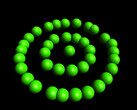As if the scene from "Back to the Future II" from 1989 had something prophetic about it. Doc Brown is looking for organic waste to power the time machine, which certainly needs a lot of energy.
If researchers at the University of Illinois Chicago have their way, this will not remain science fiction for much longer. Instead, they are presenting a method that reduces the electricity required to produce pure hydrogen to a fraction by adding so-called biochar.
Hydrogen is in demand because it has an enormously high energy density, which is three times higher than that of gasoline. Unfortunately, the easiest way to produce it is from natural gas, which doesn't really sound like a sustainable solution.
Hydrolysis is by no means the optimal approach either. Apart from the effort involved, the high energy input is the main obstacle to economic use. Only a large surplus of energy, which cannot really be desirable, would provide a remedy here.
However, if a carbon source is added to the reaction, the electricity requirement can be significantly reduced. Problem: Up to now, coal has mainly been used for this. And CO2 is also released in the process.
Instead, the researchers looked for a more readily available source and found sugar snap pea chaff, hemp residues, paper waste and cow dung. Enriched with sulphuric acid, this produces a type of biochar.
All of the species tested were able to make the hydrolysis process much more efficient. The best results were achieved with cow dung. The electricity requirement was reduced by more than 80 percent. In the laboratory test, a single solar cell that supplied 0.5 volts and 15 milliamperes was sufficient. That is less power than a small AA battery provides.
Plans are currently underway to scale up production in order to obtain significant quantities of hydrogen. One area of application has already been identified: agricultural machinery requires large quantities of fuel, so hydrogen is a good choice. And farmers have very cheap access to organic waste.
















